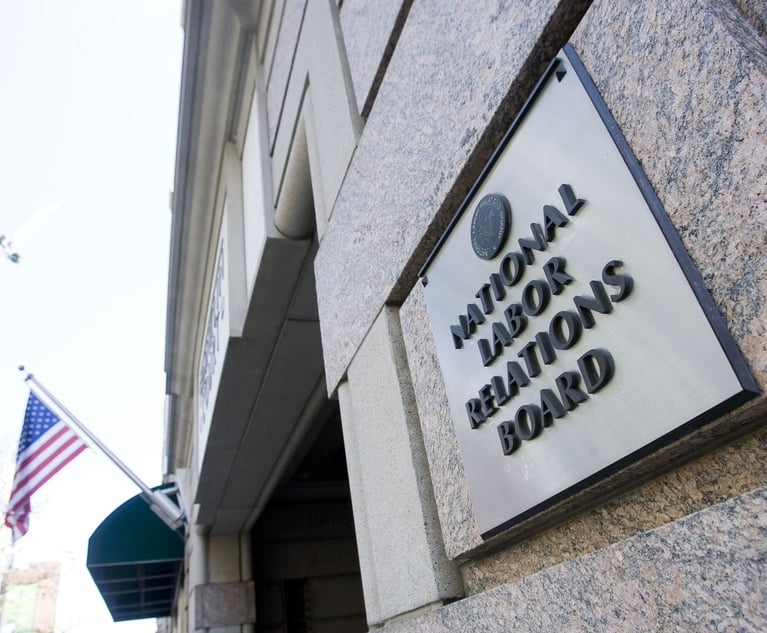76 Companies Urge Supreme Court to Support LGBT Workplace Protections
Google Inc., Apple, Uber Technologies, Facebook Inc. and others stake positions against Trump's Justice Department.
October 11, 2017 at 12:51 PM
6 minute read

Major U.S. companies and organizations, including tech giants, financial institutions and sports teams, are urging the U.S. Supreme Court to create uniform federal protections for gay, lesbian and transgender employees.
Seventy-six businesses on Tuesday filed a friend-of-the-court brief in the Supreme Court in the case Evans v. Georgia Regional Hospital, which is being considered to take up question. Companies on the brief included American Airlines, Starbucks Corporation, Deutsche Bank and The Estée Lauder Companies. Sports franchises included the Miami Heat and Tampa Bay Rays Baseball Ltd. Google Inc., Apple, Uber Technologies, Facebook Inc. and Airbnb Inc. also signed the brief.
The Supreme Court case, which gay rights advocates hope will settle the scope of workplace protections for LGBT employees, confronts whether sexual orientation should be considered sex discrimination under Title VII of the Civil Rights Act of 1964. Several other legal scholars and LGBT advocacy groups filed briefs urging the Court to take up the case.
“The nation's top corporations recognize that discrimination is bad for business,” said Greg Nevins, Employment Fairness Project Director for Lambda Legal. “When workers can bring their whole selves to work, they can focus on their jobs rather than needing to look over their shoulders worrying about whether will get fired.”
Circuit courts are split on this question and now two government agencies, the U.S. Justice Department under the Trump administration, and the U.S. Equal Employment Opportunity Commission, are also at odds.
A three-judge panel in the U.S. Court of Appeals for the Eleventh Circuit declined to hear the Evans case en banc and Lambda Legal, which represents Jameka Evans, the challenger, filed a petition in September urging the justices to take up the case. The Savannah security guard sued her former employer Georgia Regional Hospital, claiming she was harassed at work and forced to quit because she is a lesbian.
 Kathleen Sullivan
Kathleen SullivanThe coalition of businesses and organizations, organized by a team from Quinn, Emanuel, Urquhart & Sullivan and Freedom for All Americans, argued in their amicus brief that no employee should face discrimination for sexual orientation, which they argued is “inherently sex-based.” Quinn Emanuel partners Kathleen Sullivan and Todd Anten were among the lawyers who filed the brief.
“These businesses and organizations are committed to giving everyone the opportunity to earn a living, excel in their profession, and provide for their family free from fear of unequal treatment,” the amicus brief said. “Creating workplaces in which employees are and feel safe from discrimination frees them to do their best work, with substantial benefits for their employers.”
A similar amicus brief was filed in a case that was heard en banc before the U.S. Court of Appeals for the Second Circuit, Zarda v. Altitude Express, where 50 companies pressed for sexual orientation protections in the workplace. Many of the companies in these briefs overlap, including Edelman, Levi Strauss and Ben & Jerry's.
In the Second Circuit case, dozens of groups filed in support of sexual orientation protections, including the EEOC, which has trumpeted the position that sex discrimination includes discrimination against orientation and gender identity. The Trump administration's Justice Department filed an opposing brief in the Zarda case that argued Congress would need to pass sexual orientation protection and alter Title VII in order for protections to be ensured. At oral argument, Justice Department lawyer Hashim Mooppan was needled about the disconnect between the two agencies.
The coalition of companies in the Supreme Court case argued for clarity and uniform positions on this issue, particularly given the different stances from the government agencies.
The U.S. Court of Appeals for the Seventh Circuit in April said sexual orientation protection should be considered under federal civil rights laws, a decision hailed as a landmark ruling for LGBT rights. That ruling created a split, where the Eleventh Circuit and other rulings have concluded the civil rights statute does not include sexual orientation protections.
The companies noted in their brief that a survey of the top 50 Fortune 500 companies and the top 50 federal government contractors showed the majority of respondents connect policies prohibiting sexual orientation discrimination with a better bottom line. The amicus brief also argued that a patchwork of state and local regulations around the country puts some companies in a difficult position.
“We believe in treating every person we come into contact with – whether it's our employees, our consumers, or our vendors – with dignity and respect,” said Anna Walker, Senior Director for Global Policy and Advocacy at Levi Strauss & Co. “That value is central to our business – but more importantly, it's the right thing to do. Discrimination hurts people, holds back communities, and tarnishes our nation's image.”
The brief also notes that approximately 10 million adults in the United States, or 4.1 percent of all adults, identify as LGBT.
“Employment discrimination based on sexual orientation (a form of sex-based discrimination) is widespread and has significant, harmful effects on employers, employees, and the bottom line,” the brief states.
The Human Rights Campaign, which provides an equality index to examine whether employers protect LGBT workers, shows in its annual reports that most Fortune 100 companies have adopted policies to provide equal protections for gay and lesbian workers.
The 2017 report saw the largest increase in businesses in the history of the survey, 515 employers, earning perfect scores. Businesses offering transgender inclusive healthcare coverage also jumped from 511 to 647 companies over the year.
This content has been archived. It is available through our partners, LexisNexis® and Bloomberg Law.
To view this content, please continue to their sites.
Not a Lexis Subscriber?
Subscribe Now
Not a Bloomberg Law Subscriber?
Subscribe Now
NOT FOR REPRINT
© 2025 ALM Global, LLC, All Rights Reserved. Request academic re-use from www.copyright.com. All other uses, submit a request to [email protected]. For more information visit Asset & Logo Licensing.
You Might Like
View All
Trump Fires EEOC Commissioners, Kneecapping Democrat-Controlled Civil Rights Agency

Trump’s Firing of NLRB Member Could Spark Review of Supreme Court Precedent

Testing Legal Authority, Trump Fires NLRB Member, Leaving Panel Without Quorum
3 minute read
Trending Stories
- 1Uber Files RICO Suit Against Plaintiff-Side Firms Alleging Fraudulent Injury Claims
- 2The Law Firm Disrupted: Scrutinizing the Elephant More Than the Mouse
- 3Inherent Diminished Value Damages Unavailable to 3rd-Party Claimants, Court Says
- 4Pa. Defense Firm Sued by Client Over Ex-Eagles Player's $43.5M Med Mal Win
- 5Losses Mount at Morris Manning, but Departing Ex-Chair Stays Bullish About His Old Firm's Future
Who Got The Work
J. Brugh Lower of Gibbons has entered an appearance for industrial equipment supplier Devco Corporation in a pending trademark infringement lawsuit. The suit, accusing the defendant of selling knock-off Graco products, was filed Dec. 18 in New Jersey District Court by Rivkin Radler on behalf of Graco Inc. and Graco Minnesota. The case, assigned to U.S. District Judge Zahid N. Quraishi, is 3:24-cv-11294, Graco Inc. et al v. Devco Corporation.
Who Got The Work
Rebecca Maller-Stein and Kent A. Yalowitz of Arnold & Porter Kaye Scholer have entered their appearances for Hanaco Venture Capital and its executives, Lior Prosor and David Frankel, in a pending securities lawsuit. The action, filed on Dec. 24 in New York Southern District Court by Zell, Aron & Co. on behalf of Goldeneye Advisors, accuses the defendants of negligently and fraudulently managing the plaintiff's $1 million investment. The case, assigned to U.S. District Judge Vernon S. Broderick, is 1:24-cv-09918, Goldeneye Advisors, LLC v. Hanaco Venture Capital, Ltd. et al.
Who Got The Work
Attorneys from A&O Shearman has stepped in as defense counsel for Toronto-Dominion Bank and other defendants in a pending securities class action. The suit, filed Dec. 11 in New York Southern District Court by Bleichmar Fonti & Auld, accuses the defendants of concealing the bank's 'pervasive' deficiencies in regards to its compliance with the Bank Secrecy Act and the quality of its anti-money laundering controls. The case, assigned to U.S. District Judge Arun Subramanian, is 1:24-cv-09445, Gonzalez v. The Toronto-Dominion Bank et al.
Who Got The Work
Crown Castle International, a Pennsylvania company providing shared communications infrastructure, has turned to Luke D. Wolf of Gordon Rees Scully Mansukhani to fend off a pending breach-of-contract lawsuit. The court action, filed Nov. 25 in Michigan Eastern District Court by Hooper Hathaway PC on behalf of The Town Residences LLC, accuses Crown Castle of failing to transfer approximately $30,000 in utility payments from T-Mobile in breach of a roof-top lease and assignment agreement. The case, assigned to U.S. District Judge Susan K. Declercq, is 2:24-cv-13131, The Town Residences LLC v. T-Mobile US, Inc. et al.
Who Got The Work
Wilfred P. Coronato and Daniel M. Schwartz of McCarter & English have stepped in as defense counsel to Electrolux Home Products Inc. in a pending product liability lawsuit. The court action, filed Nov. 26 in New York Eastern District Court by Poulos Lopiccolo PC and Nagel Rice LLP on behalf of David Stern, alleges that the defendant's refrigerators’ drawers and shelving repeatedly break and fall apart within months after purchase. The case, assigned to U.S. District Judge Joan M. Azrack, is 2:24-cv-08204, Stern v. Electrolux Home Products, Inc.
Featured Firms
Law Offices of Gary Martin Hays & Associates, P.C.
(470) 294-1674
Law Offices of Mark E. Salomone
(857) 444-6468
Smith & Hassler
(713) 739-1250








